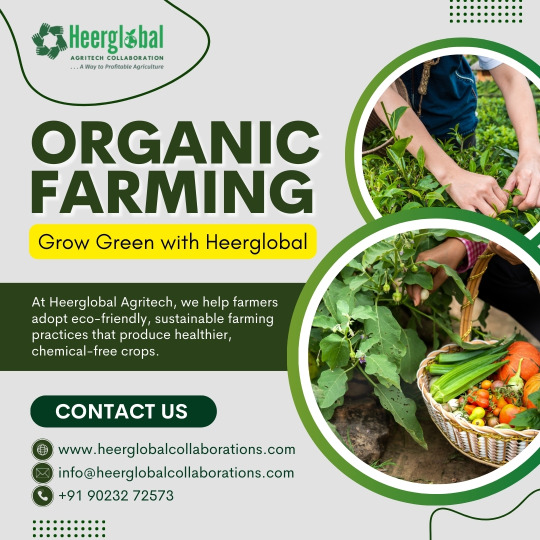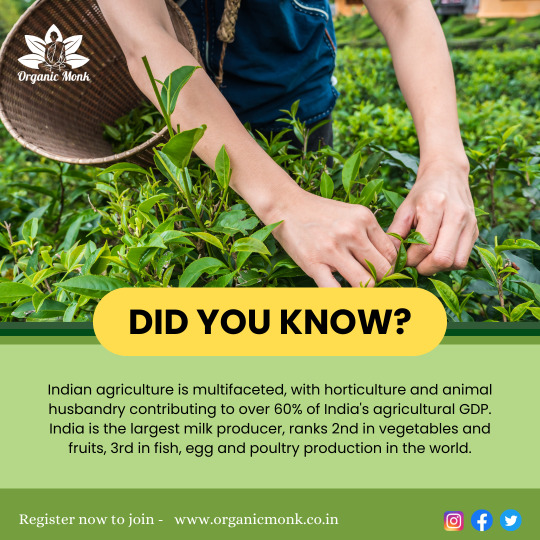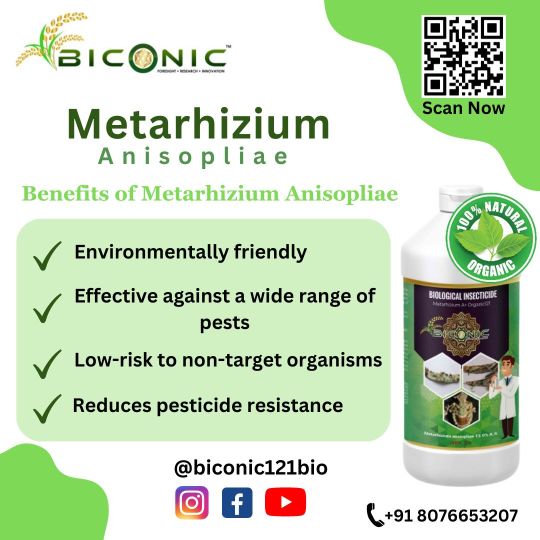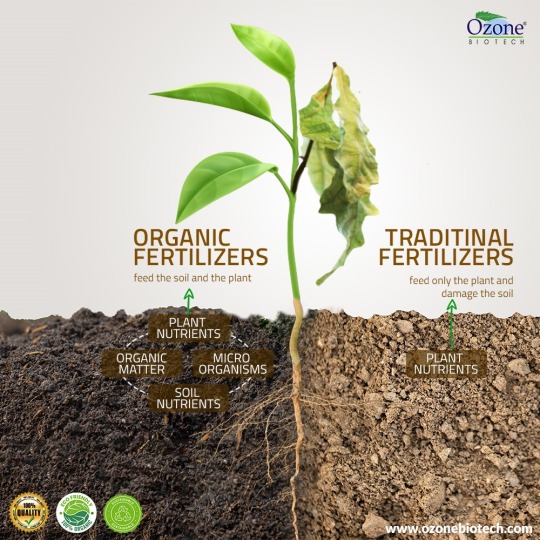#organicagriculture
Explore tagged Tumblr posts
Text
Alternative Disease Control in Organic Agriculture

The text discusses the growing concern within society regarding the environmental impacts of agriculture, particularly related to the use of pesticides and contamination of the food chain. This concern has led to significant changes in the agricultural landscape. In recent years, market segments have begun to demand differentiated products, such as those cultivated without pesticides or those that carry certification seals ensuring sustainable practices. This societal pressure has resulted in the development of more sustainable farming systems that aim to reduce reliance on chemical products
The concept of sustainable agriculture is highlighted as promoting responsible management of natural resources, meeting the needs of present and future generations without degrading the environment. This approach shifts the priorities of traditional agricultural systems, seeking a balance between food production and environmental preservation. It encourages the use of biological processes and a reduction in the consumption of energy inputs. Alternative agricultural systems are presented as a viable option to conventional methods, focusing on natural interactions. They emphasize the management of biological relationships, such as the interactions between pests and their predators, as well as natural processes like biological nitrogen fixation, rather than relying solely on chemical products. The goal is to strengthen the essential biological interactions for agricultural production instead of simplifying them. The text also mentions one of the main challenges of sustainable agriculture: the control of diseases, pests, and invasive plants.
Many techniques used to minimize phytosanitary damage can, paradoxically, lead to environmental contamination or generate changes that compromise the sustainability of the agroecosystem, highlighting the complexity and challenges involved in transitioning to more sustainable practices.

- Alternative Products Produced or Obtained in the Brazilian Market.
Initially, before the widespread availability of pesticides, farmers used natural products sourced from their surroundings or extracted from their own land. These traditional methods, which include more natural and localized techniques, have been almost completely abandoned with the popularization of pesticides, which became the norm for pest and disease control.
Today, with the growing awareness of the negative effects of pesticides on the environment and health, society is demanding a reduction in their use. This has encouraged research into more sustainable alternatives, many of which are methods that farmers employed decades ago. The text provides examples of products and techniques that can be used as alternatives to pesticides, such as:
Raw milk - for controlling powdery mildew (a fungal disease).
Biofertilizers - to prevent plant diseases.
Salts - for controlling powdery mildew.
Soil solarization - which uses solar heat to eliminate soil pathogens.
Solar collectors - for disinfecting substrates used in seedling production.
These practices aim to recover and value agricultural methods that are less harmful to the environment, reflecting a shift toward more sustainable agriculture.
- Alternative Products: Future Adoption!
Despite the existence of environmental legislation focused on eco-development, there are still significant limitations in promoting alternative and ecologically sustainable agricultural practices. Although there are many technical and scientific contributions on methods such as biological pest control, crop rotation, use of crop residues, genetic improvement, intercropping, physical control, and the use of natural products, government support to encourage these practices remains insufficient. Initiatives are considered limited, which restricts the adoption of more sustainable approaches.
Additionally, the text mentions that the increased use of alternative techniques, including pesticides, which have been part of the modernization of Brazilian agriculture since the 1960s, depends on effective public policies that promote these more sustainable practices. In summary, the author criticizes the lack of a robust agricultural policy that genuinely encourages the transition to more sustainable agricultural practices.
The text highlights that, in many situations, farmers do not apply the true philosophy of IPM (Integrated Pest Management), which advocates for the combination of different control methods (such as biological, cultural, and physical). Research on IPM began in the 1970s in Brazil, resulting in promising discoveries. However, despite these advances, IPM is still not widely adopted by farmers. In some cases, alternative practices are used to control certain pests and diseases, but not in a consistent or integrated manner. Instead, many still opt to use various types of pesticides, which goes against the principle of an integrated and sustainable approach. This suggests a resistance or difficulty in transitioning to practices that truly integrate different management strategies.
The text explains why the adoption of Integrated Pest Management (IPM) and alternative methods is limited among farmers. Three main factors are highlighted:
Cultural Practices of Farmers: Many farmers predominantly use pesticides due to their ease of use and effectiveness, combined with a lack of efficient public assistance for implementing IPM.
Training of Agricultural Technicians: The training of agricultural extension technicians often focuses on recommending pesticides as solutions, rather than addressing the underlying causes of pest and disease outbreaks or exploring existing alternatives.
Influence of the Pesticide Industry: The pesticide industry plays a significant role in providing technical assistance to farmers who adopt modern agricultural practices. Their representatives often promote pesticide use rather than integrated methods, reinforcing a culture of dependency on chemical products.
These factors collectively hinder the widespread implementation of IPM and sustainable practices in agriculture.
In the end, the text discusses the responsibility of research institutions and funding agencies in the low adoption of alternative techniques for controlling phytosanitary problems. A survey of articles published in the journals Summa Phytopathologica and Fitopatologia Brasileira revealed that alternative control practices, such as biological, physical, and cultural methods, represent only 9% and 5% of the articles, respectively. These figures, which consider 28 volumes of the first journal and 27 of the second, indicate that there is still a very small number of plant pathologists in Brazil focusing on alternative control.
The author argues that it is necessary to increase the number of specialists in this area so that plant pathology can make a more significant contribution to the environmental and social sustainability of agriculture in Brazil. The text also emphasizes that simply replacing fungicides with alternatives is not enough to ensure more sustainable agriculture. It is essential to understand the structure and functioning of the agroecosystem as a whole and to redesign production systems to make them truly sustainable. The author notes that various examples of sustainable practices have been presented to the agricultural community, suggesting that education and awareness are key to promoting effective changes.az
#organicagriculture#biological control#biology#agroecology#agriculture#plants#sustainable#sustentabilidade#agronomia#brazil#agronomist
3 notes
·
View notes
Text
Organic Agriculture: A Global Perspective
This article dives into key trends, the benefits of organic agriculture, and how it’s shaping the future of food production. Learn how different countries are contributing to sustainable practices and why organic farming matters more than ever.
🔗 Read the full article here: https://vncommex.com/organic-agriculture-a-worldwide-overview/

0 notes
Text

Organic Farming
Grow Green with Heerglobal Agritech! 🌱
At Heerglobal Agritech, we are committed to helping farmers embrace Organic Farming practices that are eco-friendly and sustainable. Our goal is to support the production of healthier, chemical-free crops for a cleaner, greener world. 🌾🍅
By adopting Organic Farming techniques, we empower farmers to cultivate crops without harmful chemicals, promoting soil health, water conservation, and biodiversity.
Join us in building a sustainable future with Organic Farming — where nature and innovation work together to feed the world! 🌍
For more information visit: https://heerglobalcollaborations.com/
#OrganicFarming#SustainableAgriculture#HealthySoil#EcoFriendlyFarming#GoOrganic#PesticideFree#SoilHealth#Biodiversity#LocalFarming#SustainableFarming#Agroecology#ChemicalFree#OrganicCertification#Farmers#GreenFuture#NaturalFarming#FarmToTable#EnvironmentallyFriendly#OrganicTransition#AgTech#OrganicPestControl#CropRotation#FarmSustainability#SustainableFood#HealthyCrops#OrganicAgriculture#FarmingSolutions#GreenAgriculture
0 notes
Text
Explore the beauty of Mahuli agro-tourism captivating gallery, showcasing an exquisite collection of images that celebrate nature's splendour and artistic wonders.
0 notes
Text
Organic Agriculture Companies in India and Their Impact on Rural Development
In recent years, organic agriculture companies in India have been making significant strides in transforming the agricultural landscape. These companies are not only promoting sustainable farming practices but also playing a crucial role in rural development. This blog explores the impact of organic agriculture companies in India on rural communities, focusing on economic growth, environmental benefits, and social empowerment.
Economic Growth through Organic Farming
One of the most notable impacts of organic agriculture companies in India is their contribution to the economic growth of rural areas. By adopting organic farming practices, farmers can often achieve higher prices for their produce compared to conventional farming. This price premium is due to the increasing demand for organic products both domestically and internationally.
Organic agriculture companies provide training and resources to farmers, enabling them to switch from traditional to organic farming. This transition not only increases farmers' income but also reduces their dependency on expensive chemical inputs. Consequently, farmers save money on inputs and enjoy better profit margins, leading to improved financial stability in rural households.
Environmental Benefits of Organic Agriculture
The environmental impact of organic agriculture companies in India is profound. Organic farming practices focus on maintaining soil health, reducing water usage, and minimizing pollution. These practices include crop rotation, the use of organic fertilizers, and integrated pest management, which collectively contribute to sustainable agriculture.
By reducing the reliance on chemical pesticides and fertilizers, organic farming helps in preserving the natural biodiversity of rural areas. This ecological balance is essential for maintaining the health of the environment and ensuring the long-term viability of agricultural lands. Moreover, organic agriculture mitigates the adverse effects of climate change by enhancing soil carbon sequestration and reducing greenhouse gas emissions.
Social Empowerment through Organic Agriculture
Organic agriculture companies in India are also instrumental in promoting social empowerment in rural communities. These companies often engage in community-building activities, such as forming cooperatives and farmers' groups. These organizations provide a platform for farmers to share knowledge, access better resources, and collectively market their products.
Education and training programs conducted by organic agriculture companies help farmers gain a deeper understanding of sustainable farming techniques. This knowledge empowers farmers to make informed decisions about their agricultural practices, leading to increased self-sufficiency and resilience.
Furthermore, organic agriculture companies often support women's participation in farming. By providing training and resources to women, these companies help break gender barriers and promote gender equality in rural areas. Empowered women farmers contribute to the overall well-being of their families and communities.
Case Study: Kavya Organic Farm
One shining example of an organic agriculture company in India making a substantial impact on rural development is Kavya Organic Farm. Kavya Organic Farm has been at the forefront of promoting organic farming practices and supporting rural communities. By working closely with local farmers, the company provides them with the necessary tools, knowledge, and market access to thrive in organic agriculture.

Kavya Organic Farm focuses on a holistic approach to farming, emphasizing the importance of sustainable practices that benefit both the environment and the farmers. Through various initiatives, the company has helped numerous rural families achieve better livelihoods and improved living standards.
The company's commitment to rural development is evident in its efforts to create a supportive community for farmers. By facilitating the formation of cooperatives and offering continuous training, Kavya Organic Farm ensures that farmers are well-equipped to meet the challenges of organic farming and maximize their benefits.
In conclusion, organic agriculture companies in India play a pivotal role in driving rural development. By promoting sustainable farming practices, these companies contribute to economic growth, environmental preservation, and social empowerment in rural areas. The positive impact of these companies extends beyond the farm, fostering a sense of community and resilience among rural populations.Kavya Organic Farm exemplifies the transformative power of organic agriculture in rural development. By supporting farmers and promoting sustainable practices, Kavya Organic Farm not only enhances the livelihoods of rural families but also contributes to the broader goal of sustainable development in India.
0 notes
Text
Transforming India's Organic Food Landscape: A Tech-Infused Revolution

Precision agriculture, blockchain, e-commerce, data-driven decision-making, and innovative startups exemplify the dynamic landscape of this tech-infused organic revolution. Read More. https://www.sify.com/ai-analytics/transforming-indias-organic-food-landscape-a-tech-infused-revolution/
#OrganicFood#OrganicFarming#Health#OrganicAgriculture#PrecisionAgriculture#OrganicFertilizer#Ecommerce#OrganicFarmer#SolarPower#PestControl#Blockchain
0 notes
Text
#biofertilizers#organic#fertilizers#agriculture#organicfarming#fertilizer#organicfertilizers#organicagriculture#organicproducts#organico#organicgrowing#farming#soil#organicgardening#sinquimicos#photodujour#sustentable#weedcuring#weeddrying#indoorgrowing#bioinsumos#weednederland#biocontrol#weedespana#weedstagram#biofertilizer#radifort#leafly#weloveweed#photooftheday
0 notes
Text

Did You Know? 😦 Indian agriculture is a great contributor to the world's economy and agricultural sector. Read this related fact about Indian Agriculture and acknowledge its rich diversity.
#organicfarming#farming#agricultural#facts#organicagriculture#sustainable#india#farmers#gdp growth#tumblrpost#production#organicmonkfarm
1 note
·
View note
Text
youtube
Organic Agriculture Webinar Series Episode 10: Opportunities for Exports to the European Region (Part 03) Watch now 👉 https://youtu.be/pzmFoX9ljn4
0 notes
Text

"Metarhizium anisopliae: The fungus with a mission to control pests." . . Contact Us:- +91 8076653207
#biofertilizers#organic#fertilizers#agriculture#organicfarming#fertilizer#organicfertilizers#organicagriculture#organicproducts#organico#organicgrowing#farming#soil#organicgardening#sinquimicos#photodujour
0 notes
Text
Organic Certification Agriculture Consultancy Services
Organic Certification Agriculture Consultancy Services
We specialize in providing expert organic certification consultancy services tailored to meet the unique needs of farmers, agribusinesses, and agricultural entrepreneurs. With our guidance, you can navigate the complex process of organic certification seamlessly and unlock the numerous benefits of certified organic production.
Why Choose Organic Certification Agriculture Consultancy?
Organic certification is more than just a label — it’s a commitment to sustainable farming practices, environmental stewardship, and consumer trust. Here’s why investing in our consultancy services is crucial for your organic certification journey:
Elevate your agricultural practices with our #OrganicCertification services, featuring top-notch #AgriConsulting and #AgricultureConsulting for #OrganicFarming and #OrganicAgriculture. Our #FarmConsultancy ensures #SustainableFarming solutions tailored for your #AgriBusiness needs. Adhere to #OrganicStandards with our comprehensive #AgriSupport, empowering #FarmersLife with #AgriInnovation and expert #FarmingAdvice. Committed to #SustainableAgriculture, we offer superior #FarmManagement and #AgriSolutions for achieving #CertifiedOrganic status. Embrace #GreenFarming with our guidance on #OrganicProduce, driving #FarmSuccess through strategic #AgriDevelopment and #OrganicFarmingCertification. From #FarmPlanning to continuous #AgricultureSupport, our consultancy fosters #AgriGrowth. Partner with us for exceptional #AgricultureConsultancy and #AgribusinessConsultancy, guided by experienced #AgricultureAdvisor and #AgricultureAdvisory services. Trust our #AgricultureExpert team to enhance your #OrganicCertification journey. We also focus on #MarketAccess, #SEO, #DigitalMarketing, and building #ConsumerTrust for your organic brand.
Please visit following Page for more Details
#Elevate your agricultural practices with our#OrganicCertification services#featuring top-notch#AgriConsulting and#AgricultureConsulting for#OrganicFarming and#OrganicAgriculture. Our#FarmConsultancy ensures#SustainableFarming solutions tailored for your#AgriBusiness needs. Adhere to#OrganicStandards with our comprehensive#AgriSupport#empowering#FarmersLife with#AgriInnovation and expert#FarmingAdvice. Committed to#SustainableAgriculture#we offer superior#FarmManagement and#AgriSolutions for achieving#CertifiedOrganic status. Embrace#GreenFarming with our guidance on#OrganicProduce#driving#FarmSuccess through strategic#AgriDevelopment and#OrganicFarmingCertification. From#FarmPlanning to continuous#AgricultureSupport#our consultancy fosters
0 notes
Text
Unwind & reconnect with nature! Explore the best agro-tourism stays with hands-on organic farming experiences. Learn, relax, & enjoy! Mahuli Agro Tourism.
0 notes
Text
How to Start Your Own Organic Agriculture Company in India

The organic farming sector is witnessing significant growth in India, driven by increasing consumer awareness about health and environmental sustainability. Starting your own organic agriculture company in India can be a rewarding venture, both financially and ethically. This guide will walk you through the essential steps to establish and grow your organic farming business, ensuring you make informed decisions along the way.
Understanding Organic Farming:
Before diving into the business, it’s crucial to understand what organic farming entails. Organic farming avoids synthetic chemicals, relying instead on natural processes and inputs to cultivate crops. This method promotes soil health, biodiversity, and sustainability, making it an attractive choice for modern consumers.
Steps to Start Your Own Organic Agriculture Company in India:
1. Market Research and Planning:
Begin by conducting thorough market research. Understand the demand for organic products in your target area, identify your competition, and determine what crops are most in demand. This research will help you develop a robust business plan, outlining your business goals, target market, marketing strategy, and financial projections.
2. Selecting the Right Location:
The success of your organic farming business largely depends on choosing the right location. Look for land with fertile soil, adequate water supply, and favorable climatic conditions for the crops you plan to grow. It’s also beneficial to be near markets where you can sell your produce.
3. Certification and Legal Requirements:
To sell your produce as organic, obtaining certification is mandatory. In India, the Agricultural and Processed Food Products Export Development Authority (APEDA) regulates organic certification. Familiarize yourself with the National Programme for Organic Production (NPOP) standards and apply for certification through an accredited agency. Ensure you comply with all legal and environmental regulations to avoid any future hassles.
4. Sustainable Farming Practices:
Implement sustainable farming practices that align with organic farming principles. Use organic seeds, natural fertilizers like compost and manure, and eco-friendly pest control methods. Crop rotation, polyculture, and green manure are essential techniques to maintain soil health and fertility.
5. Building a Knowledgeable Team:
Having a team knowledgeable in organic farming practices is crucial for success. Hire or train staff in organic farming techniques, soil management, and pest control. Continuous education and training will help your team stay updated with the latest organic farming trends and innovations.
6. Infrastructure and Equipment:
Invest in essential infrastructure and equipment needed for organic farming. This includes irrigation systems, storage facilities, composting units, and farming tools. Efficient infrastructure and modern equipment can significantly enhance productivity and reduce labor costs.
7. Marketing and Sales Strategy:
Develop a strong marketing and sales strategy to reach your target audience effectively. Utilize digital marketing, social media, and local farmers' markets to promote your products. Highlight the benefits of organic produce, such as health advantages and environmental sustainability, to attract health-conscious consumers.
8. Building Relationships:
Establish strong relationships with suppliers, retailers, and customers. Networking with other organic farmers and joining organic farming associations can provide valuable insights and support. Collaborating with local restaurants, supermarkets, and online platforms can also expand your market reach.
9. Continuous Improvement:
Organic farming is a dynamic field with continuous advancements in techniques and practices. Stay updated with the latest research, attend workshops, and be open to adopting new methods that can improve the quality and yield of your produce.
Conclusion:
Starting your own organic agriculture company in India is a fulfilling endeavor that requires careful planning, dedication, and continuous learning. By following these steps, you can establish a successful organic farming business that meets the growing demand for sustainable and healthy food. Companies like Kavya Organic Farm serve as excellent examples of how commitment to organic farming principles can lead to a thriving business. Embark on your journey to contribute to a healthier planet and a more sustainable future by starting your own organic agriculture company in India.
0 notes
Text

Bird Eye Chilli Price is India what is price of Assam Longi Mirch #cassia #cardamom Spicy chilli powder in India what is price of Bay Leaf #tejpata #dalchini #bhutjolokiapowder #chilly #food #cinnamon #cardamom #cardamom #sandalwood #turmeric #kashmiri #tejaji #ginger #clove #bhutjolokia #long #vietnamcassia #tejpata #cardamom #long #clove #cassia #tejachili #clove #cassia #cinnamon #cassia #cardamom #cinnamon #clove #bhutjolokia #clove #cardamom #clove #cassie #chilli #dryginger #gingerslice #sarpagandha #stoneflower #cassia #fragrantswamp #pavonia #fragrantpavonia #chilli #staranise #cassia #cardamom #clove #dalchini #ghostpepper #dryginger #clove #blackrice #sonamasoori #clove #turmericspent #joharice #cinnamon #cinnamonunpolished #turmeric #jatamasi #chiaseeds #perilla #manjistha #staranise #cinnamoroll #split #clove #kababchini #cubebpepper #c4cinnamon #c4gradecinnamon #cinnamonexport #exportnnamon #c4gradedalchini #blackrice #joharice #basmatirice #clove #ghostpepper #turmeric #ginger #cardamom #cassia #cassiaroll #cinnamonroll #dalchini #blackrice #cardamom #cassia #pepper #spices #organic #organicginger #birdeye #cardamom #bhutjolokia #ceylon #gurunanakjayanti #dalchini #clove #lokhandi #pineapple #chilkalokhandi #gorbale #ixorabrachiata #dalchiniwholesalemarket #tejpata #cardamom #blackrice #chili #tejpata #pepper #clove #bayleaf #birdeye #longimirch #cardamom #perilla #sarpagandha #cardamom #pepper #cassia #cinnamon #dalchini #ghostpepper #bhutjolokia #nagakingchilli #blackrice #bambooshoot #stoneflower #staranise #patharphool #broomgrass #grassbroom #bireyechilli #Longimirch #tejachili #chiliflakes #turmeric #ginger #dryturmeric #dryginger #sonamasoori #ir64rice #redrice #whitestickyrice #joharice #akhuni #kiwi #mustardseeds #fssai #apeda #teaboardindia #organicspices #organicagriculture #organicfarming #organicchillitrading #organicginger #organicturmeric #organicflakes #organickiwi #kiwi #organicardamom #organicbayleaf #organictejpata #bayleaf #tejpata #nikenterprise #abhijitroy #APEDA #FSSAI #FssaiRegistration #fssailicense #fssailicenseregistration #fssaiapproved #fssaiindia #teaboard #organicindia #organicharvest
https://nikenterprise.com/ Nik Enterprise is a Pan India Company.
For More Information: Call 9612237920 Whatsapp 9612237920 Whatsapp https://wa.me/qr/BJO7IE4EPOZWC1 email [email protected]
Facebook https://www.facebook.com/nikenterprisee LinkedIn https://www.linkedin.com/company/nikenterprise/ Twitter https://twitter.com/nikenterprisee Koo https://www.kooapp.com/profile/nikenterprise Instagram https://www.instagram.com/nikenterprisee/ Indiamart https://www.indiamart.com/nik-enterprise-dimapur/ Quora https://www.quora.com/profile/Nik-Enterprise-3 Pinterest https://in.pinterest.com/nikenterprise/ medium https://medium.com/@nikenterprise
0 notes
Text
"Future-Proof Farming: Agricultural Pheromones Market Outlook (2024-2033)"
Agricultural pheromones are revolutionizing the way we approach pest control, offering a sustainable and environmentally friendly alternative to chemical pesticides. These naturally occurring substances are used to manipulate the behavior of insects, particularly in disrupting mating patterns, thereby reducing pest populations without harming other species or the ecosystem. By integrating pheromones into modern farming practices, we can significantly lower our reliance on harmful chemicals, improve crop yields, and contribute to a healthier planet. As the demand for organic and eco-conscious products grows, the adoption of pheromone-based solutions is becoming increasingly vital for sustainable agriculture.
#SustainableFarming #EcoFriendly #OrganicAgriculture #AgroTech #GreenRevolution #PheromoneTech #SmartFarming #CropProtection #NaturalPestControl #AgroInnovation #EcoSustainability #FutureOfFarming #InsectControl #PestManagement #AgriTechSolutions #FarmToTable #BioAgriculture #HealthyCrops #GreenAgriculture #NatureBasedSolutions
0 notes
Text

In India, the fertility of soil faces a perilous decline due to the widespread use of harmful chemical fertilizers. This escalating predicament disrupts the delicate balance of the ecosystem, affecting crop yields and long-term agricultural sustainability. It's time for a green revolution! Embrace the change by swapping out those harmful chemicals for 100% organic fertilizers.
Nurture the soil, revive its vitality, and extend its life cycle. Let's cultivate a sustainable future, where our soils thrive, crops flourish, and the earth breathes a sigh of relief. Join the movement towards healthier, more robust agriculture. The choice is simple: embrace organic solutions and watch our soils reclaim their fertility, ensuring a bountiful harvest for generations to come.
Learn More 100% Organic Neem Products : https://www.ozonebiotech.com/ . . . . . . . . . . . . .
#OrganicRevolution #SustainableAgriculture#organicfarming#agriculture#ecosystem#organicfertizers#cropprotection#ozonebiotech#ozoneem#neem#chemicalfertilizer#organicgrowth#organicfood#organicagriculture#agriculture#agriculturalinnovation#agricultureandfarming
0 notes